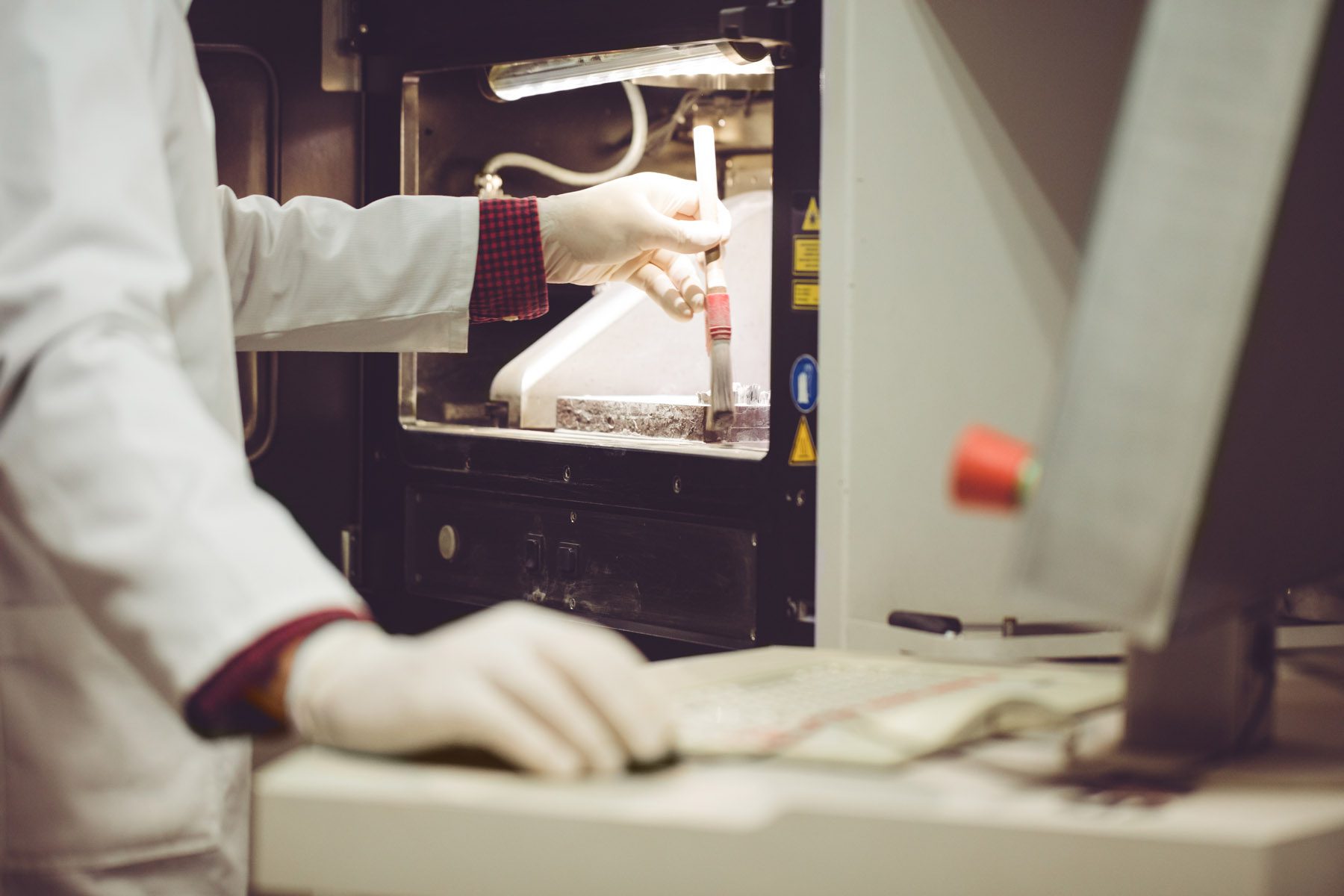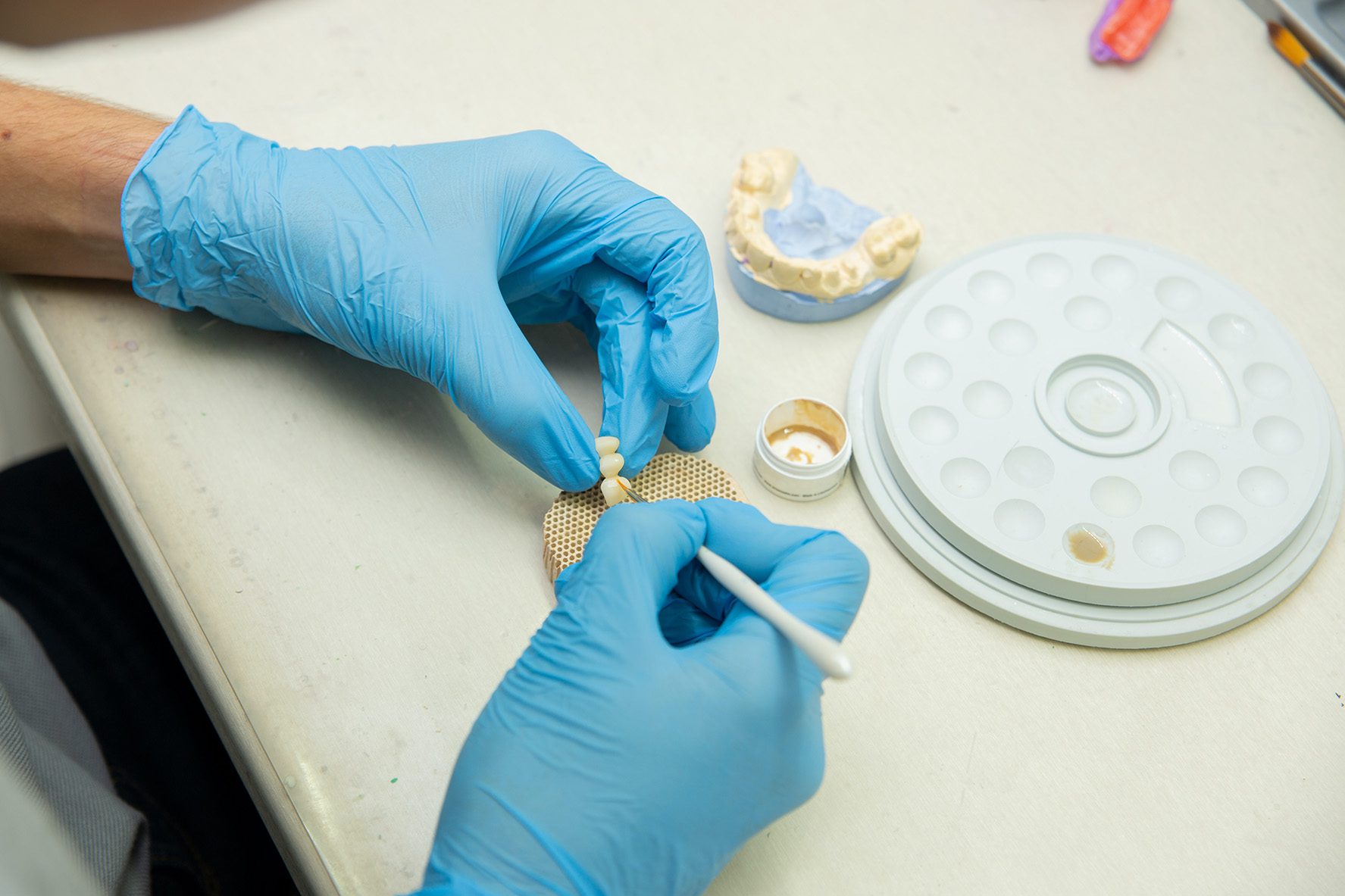

Implant-supported bridges are a type of dental restoration that uses two or more dental implants as anchors to support a bridge, which consists of one or more replacement teeth.
In this post, we will be discussing what an implanted-supported bridge is, why they are helpful in the dental care industry, how many implants are typically used with these bridges, and the types of implant-supported bridge solutions.
We’ll also compare and contrast implant-supported bridges with traditional bridgework in terms of their advantages and disadvantages for patients in regard to durability, aesthetics, procedure, and overall dental health.
Let’s get started!
An implanted-supported bridge is a type of dental restoration that uses two or more dental implants as anchors to support a bridge, which consists of one or more replacement teeth. Implanted-supported bridges provide greater stability than traditional bridgework and are typically used in cases where there are no adjacent teeth to use for support.
Implanted-supported bridges can be a great option for those who have suffered tooth loss or damage to the teeth due to gum disease, decay, or trauma. These bridges provide greater stability than traditional bridgework by anchoring directly into the jawbone to support the bridge.
Read more about dental implant bridges.
The implants also reduce bone deterioration that can occur when teeth are missing and help maintain your face shape and smile. Additionally, implanted-supported bridges make it easier for your patients with missing teeth to perform daily oral hygiene tasks such as brushing and flossing, as well as speaking clearly.
The implants also reduce strain on adjacent teeth since they don't put extra pressure on them as traditional bridgework does. Finally, the process of making and fitting an implanted-supported bridge usually takes fewer office visits than traditional bridgework methods.
Watch: Successful Implant Solutions
Implanted-supported bridges are helpful in the dental care industry due to many reasons:
Learn more about dental implant crows at Keating!
The number of implants used in an implant-supported bridge can vary depending on the case and individual needs. Generally, two or more dental implants are used to support a bridge. However, in some cases, four, five, six, or even more implants may be used if necessary.
We sort 3 main types of implant-supported bridges:
Cemented bridges are a type of implant-supported bridge that is held in place by metal clasps and adhesive cement.
They tend to be less expensive than other types of implanted-supported bridges, but due to the adhesive cement and metal clasps involved, these bridges are not as durable.
Screw-retained bridges use screws to attach the bridge directly to dental implants, providing a secure and lasting solution for replacing missing or damaged teeth.
These bridges have no metal clasps or cement, like with the cemented bridges, which makes them more durable and esthetically pleasing.
They also tend to be more expensive than other types of implanted-supported bridges but can last up to 20 years with proper care.
Zirconia/porcelain fused to metal (PFM) bridges is a combination of zirconia and porcelain fused together through a special bonding process. This type of bridge offers an extremely durable solution for replacing missing or damaged teeth because it provides both strengths from the metal and aesthetics from the porcelain material.
Discover Keating's PFM products
Unlike cemented and screw-retained bridges, PFM bridges do not need any additional support from metal clasps or screws since the bonding process creates one solid unit.
Additionally, PFM bridges are known for their lifelike appearance since they can replicate tooth color, shape, and texture more accurately than other types of implant-supported bridge solutions.
Read: 7 Facts to Know About Porcelain-Fused to Metal Crowns
Implant-supported bridges and traditional bridges both provide benefits for patients in terms of replacing missing or damaged teeth, but they each have different advantages and disadvantages in regard to durability, aesthetics, procedure, and overall dental health.
In terms of durability, implant-supported bridges outrank traditional bridges since their anchoring directly into the jawbone provides more support against wear and tear over time. Additionally, because there are no metal clasps or cement used with implant-supported bridges like there is with traditional bridgework, these solutions can last up to 20 years with proper care.
Aesthetically, implant-supported bridges offer an advantage as well due to offering life-like replicas of teeth through materials like zirconia or porcelain fused to metal (PFM) that can replicate tooth color, shape, and texture more accurately than other bridge solutions.
Traditional bridges also can look natural if a quality ceramic material is used but not as well as implanted-supported bridges.
The procedure between implant-supported and traditional bridges is also different. Traditional bridgework requires fewer office visits than implanted-supported solutions. This is because additional steps are needed for the implants such as a placement healing period before the bridge is placed on top of them.
Finally, in regard to overall dental health, implanted-supported bridge solutions reduce bone deterioration. Implant-supported bridges can also help maintain the face shape and smile due to the direct anchoring of the bridge onto the jawbone.
When talking to your patients about their options, make sure to be clear on each
In conclusion, implanted-supported bridges provide greater stability than traditional bridgework by anchoring directly into the jawbone to support the bridge and reduce strain on adjacent teeth. In comparison with traditional bridges, they offer superior longevity, durability, and aesthetics.
We hope this blog post has been useful to help you discuss with your patients and to make a better decisions when considering their treatment options.
Fill out the form to send us a quick message, and we’ll get back to you right away!
16881 Hale Ave
Irvine, CA 92606
Main Phone: 1-800-433-9833
Request New Doctor Kit
Phone: 1-800-433-9833
Email: sales@keatingdentallab.com
Request Shipping Supplies
Phone: 1-800-433-9833
Email: sales@keatingdentallab.com
Founded in 2002, Keating Dental Lab is a full-service dental laboratory serving dentists and patients throughout the United States. Think of Keating as your one-stop solution, offering everything from case planning and diagnostic waxing, to full arch implant hybrid restorations.
Thank You!
Your information has been received.
CHECK YOUR EMAIL FOR DETAILS ON HOW TO RECEIVE YOUR DISCOUNT.
Click here to learn more about Keating Dental Lab.

Thank You!
Your information has been received.
If you have a question, or would like to talk to us about a case, give us a call:
877-872-3510
Click here to learn more about Keating Dental Lab.

Thank You!
Your information has been received.
If you have a question, or would like to talk to us about a case, give us a call: 877-872-3510
Click here to learn more about Keating Dental Lab.

{field:firstname}
Get Your Free Keating Doctor Kit
Experience the ‘Keating Difference’